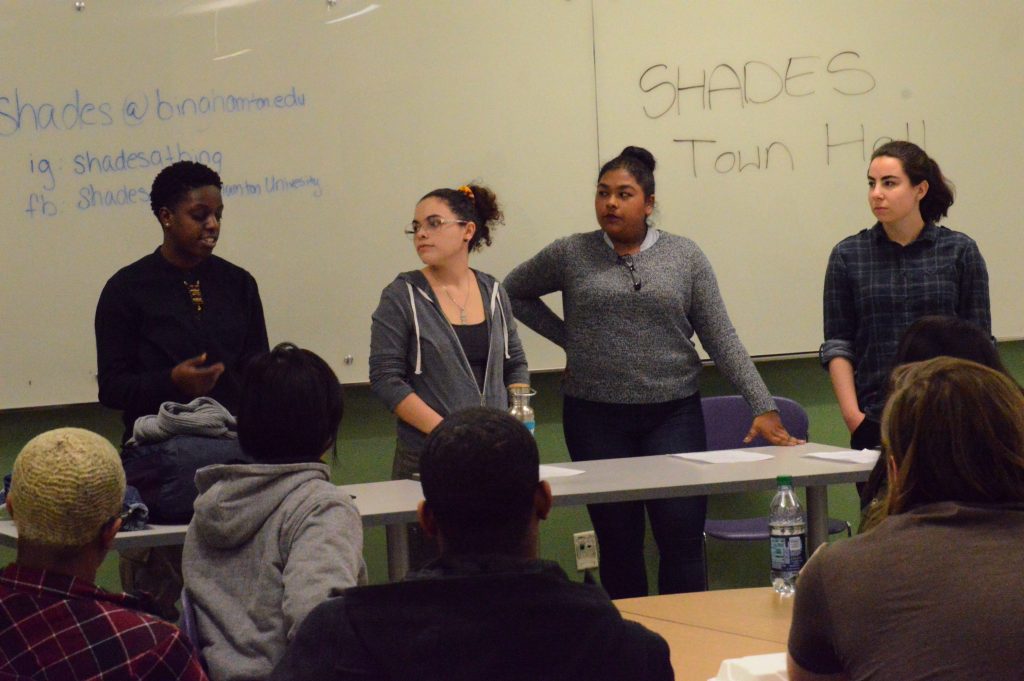
Chukwudi Kanu remembers going to SHADES events as a freshman and seeing an open, social community with vibrant events. Now, Kanu is a senior, and SHADES doesn’t have the same gatherings.
A decline in the club’s prominence inspired it to hold a town hall meeting on Monday night, where four of the club’s executive board members faced a crowd of roughly 50 people to discuss the organization’s current state and future plans.
SHADES formed in 2011 to help empower students of color and the LGBTQ community and to create a safe space for them. At first, the club saw good attendance, but has recently struggled with maintaining membership, finding students to lead the club and getting space to host meetings.
For many attendees, the state of SHADES has been a wake-up call. Kanu, who is majoring in systems science and industrial engineering, said he didn’t expect SHADES’ situation to be so bad.
“For an organization like this to get into this type of situation, it’s honestly ‘wow’ to me because they supported a base that actually needs that help, needs that support,” Kanu said. “So it’s a red flag already that they need that support.”
Glenn Avisado, the Student Association executive vice president and a senior triple-majoring in business administration, political science and economics, said clubs that lack consistent memberships have trouble acquiring a budget and a meeting space.
“For SHADES, if they’re not having that much membership, it makes it hard to justify getting a budget if they want one,” Avisado said. “If you’re only getting e-board plus two or three members, it’s kind of hard to say that your club deserves to reserve this room when there’s this other club that also needs this space for all their members.”
But for many of the people who attended the meeting, SHADES has a special and necessary existence that’s different from other clubs. Folake Oladele, a sophomore majoring in biology, said SHADES represents a safe haven for both people of color and for people in the LGBTQ community, both of whom are minorities on campus.
“SHADES is very inclusive — definitely a home away from home for anyone struggling with their identity,” Oladele said. “I feel like it’s very important that they stay here, always.”
Despite the meeting’s specific focus on SHADES’ status, many attendees noted that the club’s current situation reflects a larger problem faced by many multicultural and LGBTQ clubs, including declining membership and greater competition among themselves.
SHADES’ current situation can be partially attributed to its competition for membership with other organizations like the Rainbow Pride Union (RPU) and the Q Center. RPU, which formed in 1971, also aims to provide a safe haven for the LGBTQ community on campus, and the Q Center, which opened on campus in fall 2016, provides more resources and support for the LGBTQ community.
Kelly Clark, the director of the Q Center, wasn’t immediately available to comment on SHADES or the town hall.
According to Bianca Amanini, the multicultural affairs vice president of Broome Hall of Newing College and a sophomore majoring in psychology, the lack of unity within the LGBTQ community closely resembles that of the multicultural community. Amanini said she didn’t want to see the LGBTQ clubs become competitive and divided like the cultural clubs.
“We’re all supposed to be unified,” Amanini said.
Participants at the town hall proposed greater collaboration and empowerment between clubs. Kalissa Sawyer, the acting vice president of SHADES, president of the Latin American Student Union and a senior majoring in human development, said collaboration with other clubs may be the key to reaffirming SHADES’ future.
“I’m optimistic about collaboration and hopefully getting consistent support,” Sawyer said. “All those who are on e-board now, we definitely want to see SHADES prosper and become even bigger than it is now. We’re all going to keep the pressure on, even if, worst comes to worst, we have to do it alone.”


